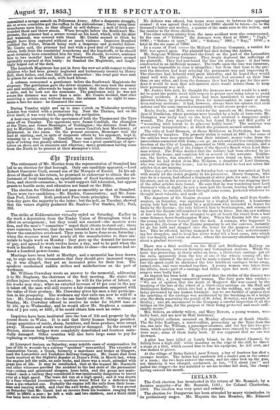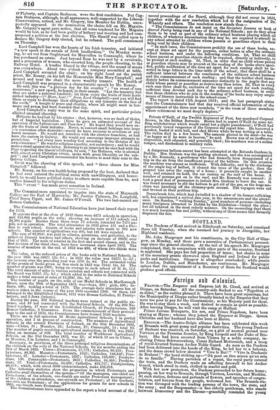IRELAND.
The Cork election has terminated in the return of Mr. Boamish, by a decisive majority—For Mr. Beamish, 1183 ; for Colonel Chatterton, 1003. The election was very quiet and orderly.
The election for Dungarvan has been attended by many vicissitudes in its preliminary stages. Mr. Maguire the late Member, Mr. Edmond
O'Flaherty, and Captain Brabazon, were the first candidates. But Cap- tain Brabazon, although, to all appearance, well-supported by the Liberal- Conservatives, retired, and Mr. Gregory, late Member for Dublin, unex- pectedly appeared. At the nomination the choice fell on Mr. Maguire. Mr. Gregory's agent gave notice, that all votes tendered for Mr. Maguire would be lost, as he had been guilty of bribery and treating and had com- promised a petition at the last election. The Sheriff was called upon to declare Mr. Gregory duly elected, but he refused. The poll commenced on Thursday.
Lord Campbell has won the hearts of his Irish tenantry, and initiated "a new epoch in the annals of Irish landlordism." On Monday morn- ing, he set out from Oughterard for Moycullen in Connaught, where he has purchased an estate. Just beyond Ross he was met by a cavalcade, and a procession of women, who escorted him, the people cheering, to the Railway Hotel. A bonfire blazed in the village, and the sound of music was everywhere. About two o'clock the company assembled at table. Lord Campbell occupied the chair; on his right hand sat the parish priest, Mr. Kenny, on his left the Honourable Miss Mary Campbell ; and around and near the chair the more wealthy tenants. The health of Lord Campbell was proposed in a characteristic speech by Mr. Kenny. He said, this was "a glorious day for his country" ; "an event of rare occurrence," a new epoch, he hoped, in their annals. "Let the tenantry feel they are under a paternal landlord; let them enjoy the fruits of their hard- earned industry—("Hear, hear ! " from Lord Campbell)—and you will find them es ready to discharge their obligations as any tenantry on the face of the earth." A temple to peace and charity, where all might meet in har- mony and peace, had been founded that day.
Lord Campbell's reply was in the same spirit, and particular points elicited unusual cheering.
Hitherto he had lost by his estates : that, however, was no fault of theirs, but of Imperial legislation. [Here he gave an animated account of the operation of the Labour-rate and Poor-law.] He hoped they would now en- joy the fruits of their industry. Never, to convert small holdings into large —a conversion often desirable—would he have recourse to evictions or any harsh measure. He would not interfere with the elective franchise, as had been the custom in Galway. He would not encourage improper attempts to proselytize. " Let every man worship God according to the dictates of his own conscience." He was for religious equality, not ascendancy ; and he would make a stand against the latter. Referring to an interview he once had with the Pope respecting the Queen's Colleges, he said, " his Holiness, who is adorned with almost every Christian virtue, spoke with great liberality on the sub- ject"; and Lord Campbell recommended his hearers to send their sons to the Galway College.
Great was the cheering of this speech, and " three cheers for Miss Campbell" followed.
Mr. Kenny, on his own health being proposed by the host, declared that he had ever entered the political arena with unwillingness, and hence- forth he would leave political duties to others more capable than he, and confine himself to his religious duties. This " event " has made great sensation in Ireland.
The Commissioners appointed to inquire into the state of Maynooth. College are the Earl of Harrowby, Mr. Justice Patteson, Dr, Longfield, Chief Baron Pigott, and Mr. James O'Ferrall. The two last-named are Roman Catholics.
The Commissioners of National Education have just issued their report for 1852.
It appears that at the close of 1852 there were 4875 schools in operation, and 514,604 pupils on the rolls; showing an increase of 171 schools and 24,203 pupils. Besides these there were 75 schools, intended for 7475 pu- pils, not in operation. The total attendance in 1852 gives Ill and a frac- tion to each school. Grants of books and salaries were made to 264 new schools. The number of applications was 405, but 141 were rejected.
The sum of 82,9641. was paid in salaries, premiums, and gratuities, to the principal literary teachers and others, showing an increase of 68831. over that of 1851. The scale of salaries in the first and second classes, and in the first division of the third class, have been increased since April 1852. The number of monitors at the end of 1852 was 400, of whom two-thirds were male.
The value, at the reduced prices of the books sold to National Schools, in the year 1851 was 58871. 15s. 9d. ; in 1852 the value was 64671. ls. 5d. ; the increase over the preceding year was 5791. 5s. 8d. The estimated value of the grants of books given as free stock in 1852 was 79441. 16s. 5d. The number of grants was 2305; being an average to each school of 31. 88. 11d. The total amount of sales to various societies and schools not connected with the Board was 91011. 178. 8d.; which added to the sales to National Schools makes a total amount of sales of 15,5681. 19s. Id.
The number of pupils on. the rolls of our Model Schools in Marlborough Street, upon the 30th of September 1852, was—boys, 599 ; girls, 480 ; in- fants, 400; making a total of 1479. The average daily attendance has at various times in the course of the year 1852 exceeded 1200. Of these, 145 belonged to the Established Church, 1311 were Roman Catholics, 21 Presby- terians, and 2 Jews (infants).
During the year, 302 National teachers were trained at the public ex- pense, and 40 not connected with the National Schools. Of the 302 Na- tional teachers, 17 were of the Established Church, 43 Presbyterians, 240 Roman Catholics, 2 Dissenters. From the commencement of their proceed- ings tp the end of 1852, the Commissioners have trained 3420 teachers. There are in full operation 26 Model Agricultural Schools, 1 in partial operation, and 2 in process of construction. The numbers of Agricultural Schools in the several Provinces of Ireland, on the 31st December 1852, were—Ulster, 31; Munster, 25; Leinster, 22; Connaught, 14; total 92. The number of pupils receiving agricultural instruction, in 1852, was 2355 ; being an increase of 629. The total number of Workhouse Agricultural Schools, on the 31st December 1852, was 23; of which 12 are in Ulster, 7 in Munster, 3 in Leinster, and 1 in Connaught.
Summary, in provinces, of the three principal religious denominations of the children on the rolls of the National Schools, for six months ending the 31st of March 1862. Ulster—Protestants, 17,773; Catholics, 86,253; Pres- byterians, 40,305. Munster—Protestants, 1523; Catholics, 148,849; Pres- byterians, 57. Leinster—Protestants, 3337; Catholics, 125,029; Presbyte- rians, 159. Connaught—Protestants, 2051; Catholics, 64,586; Presbyte- rians, 97. Total—Protestants, 24,684; Catholics, 424,717; Presbyterians, 40,618 ; which, with about 3000 undenominated, make 498,018.
The following statistics show the proportion in which Protestants and Catholics avail themselves of the system—" Of the managers, one-third are Protestants; of the schools, one-fourth are under Protestant management; of the children in attendance, one-seventh are Protestant ; of the teachers, one-fifth are Protestant ; of the applications for grants for new schools in 1851, one-fourth were Protestant"
The Commissioners have appended to the report a brief account of the recent proceedings of the Board, although they did not occur in 1852, together with the new resolution which led to the resignation of Dr. Whately and others. The resolution now stands thus-
" The Commissioners do not insist on the Scripture Lessons or book of Sacred Poetry being read in any of the National Schools ; nor do they allow them to be read as part of the ordinary school business Oaring which all children, of whatever denomination they may be, are required to attend) in any school attended by children whose parents or guardians object to their being read by their children. " In such cases, the Commissioners prohibit the use of these books, ex- cept at times set apart for the purpose, either before or after the ordin school business, and under the following conditions. 1st, That no child whose parent or guardian objects shall be required, directly or indirectly, to be present at such reading. 2d, That, in order that no child whose parent or guardian objects may be present at the reading of the books above speci- fied, public notification of the time set apart for such reading shall be in. sorted in large letters in the time-table of the school; that there shall be a sufficient interval between the conclusion of the ordinary school business and the commencement of such reading ; and that the teacher shall imme- diately before its commencement announce distinctly to the pupils that any child whose parent or guardian so desires may then retire. 3d, That in every such case there shall be, exclusive of the time set apart for such reading, sufficient time devoted each day to the ordinary school business, in order that those children who do join in the reading of the books may enjoy ample means of literary instruction in the school-room."
The report is dated 12th August 1853; and the last paragraph states that the Commissioners had that day received official information of the appointment of the three new members, " in the room of three members whose retirement we most deeply deplore."
Private O'Neill, of the Twelfth Regiment of Foot, has murdered Corporal Brown, in the Belfast Barracks. Brown had to report O'Neill for some tri- fling misbehaviour which would entail but a slight punishment ,• O'Neill had previously vowed vengeance if the Corporal did report him. He borrowed a musket, loaded it with ball, and shot Brown while he was writing at a table. The victim died in a few hours. The assassin gloried in the deed—he was " as happy as if he were in heaven," he said. Brown was of an inoffensive disposition, well educated, and generally liked ; his murderer was of a sullen temper, and disobedient to military rules.
A dangerous balloon-ascent has been attempted at the Rotunda Gardens in Dublin. Mrs. Graham was the guiding aeronaut, and she was accompanied by a Mr. Kennedy, a gentleman who had formerly been disappointed of a trip in the air from the insufficient power of the balloon. On this occasion the machine was almost as inefficient. With difficulty, and by the discharge of the single bag of ballast, it cleared the trees of the garden ; then the grapnel tore away the coping of a house ; it presently caught in another wall, and retained its hold, the car resting on the roof of the house. A number of persons got on to the roof, and Mr. Kennedy was rescued : it took a great deal of persuasion to induce Mrs. Graham to leave the car. It was found necessary to alit the balloon to get rid of the gas, as the huge ma- chine was knocking off the chimney-pots around. The voyagers were out and bruised in their perilous trip.
Donnybrook fair, which had dwindled to a shadow of its former rollicking self, has experienced a revival this year, in the amusements and the attend- ance. On Sunday, " walking Sunday," great numbers of persons—including many foreigners attracted to Dublin by the Exhibition—visited the place ; but all behaved in the most orderly manner. On the succeeding days there was much harmless fun and jollity, without any of those scenes that formerly disgraced the fair.

























 Previous page
Previous page